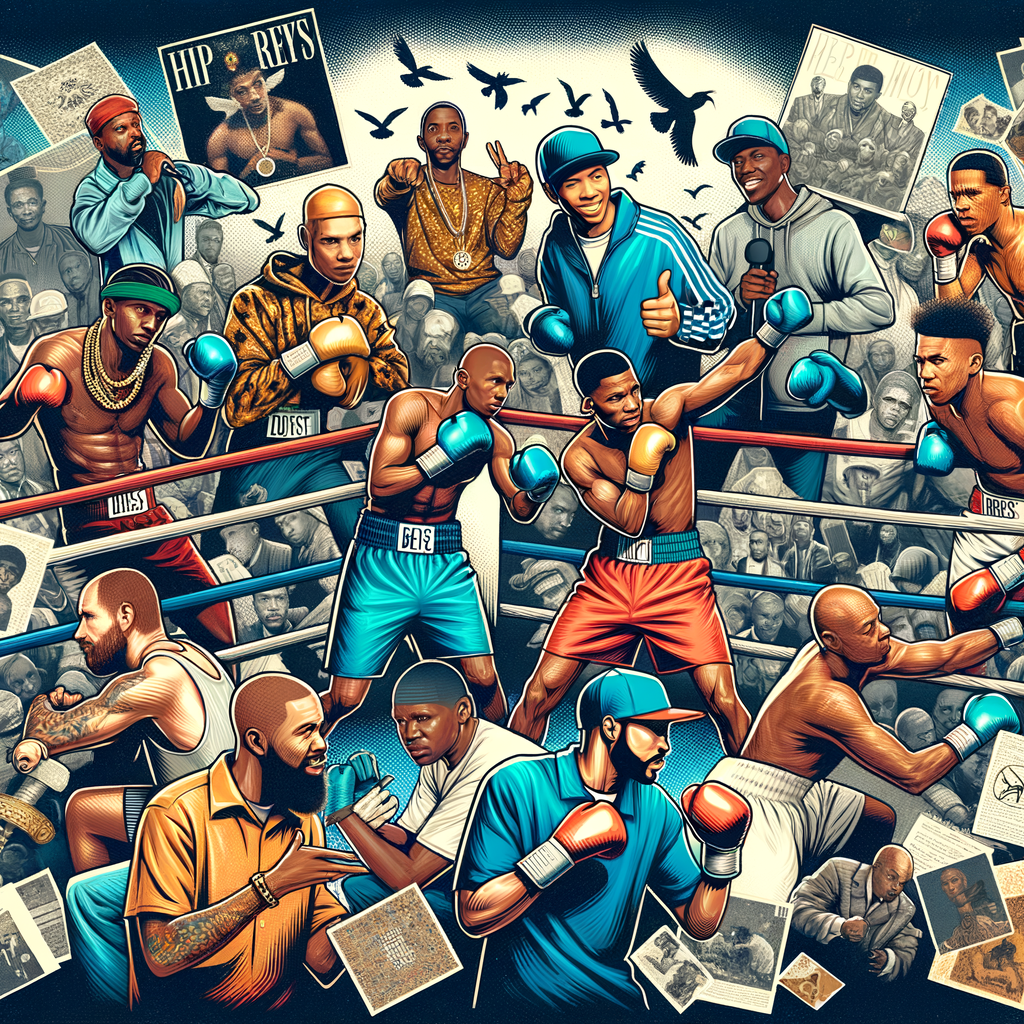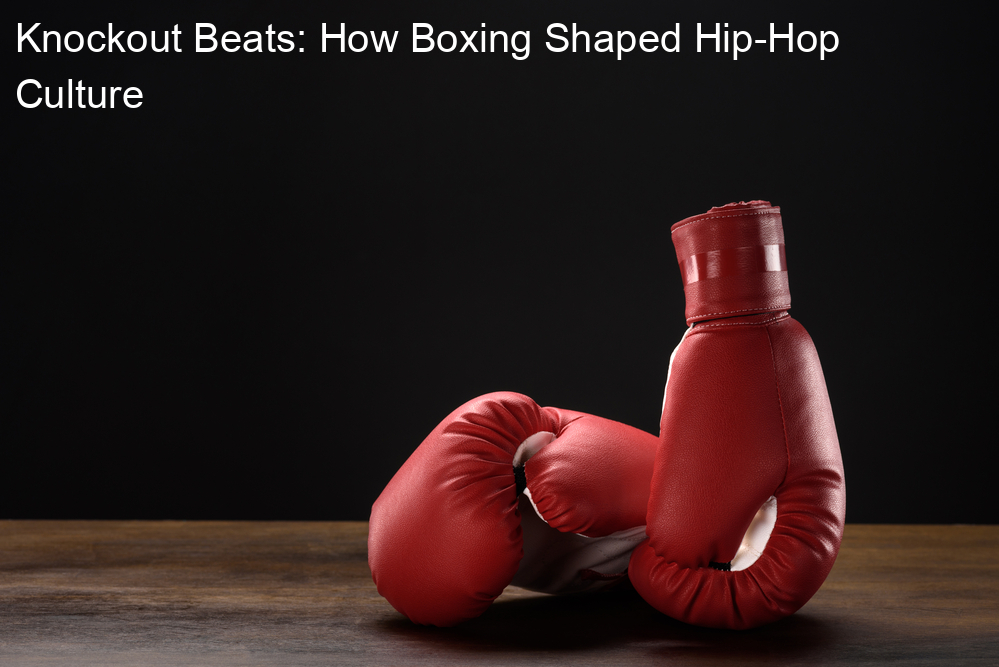
Introduction: Boxing and Hip-Hop Culture
Boxing and hip-hop are two powerful forces that have shaped popular culture for decades. They share a deep-rooted connection that goes beyond the surface. This article will explore the intricate relationship between these two cultural phenomena.
- The connection between boxing and hip-hop
- Historical context of boxing in hip-hop culture
Boxing and hip-hop have always been intertwined. Both have been expressions of struggle, resilience, and triumph, often acting as a voice for the underrepresented and marginalized communities. The raw energy, rhythm, and competitiveness found in both boxing and hip-hop have created a unique bond between them.
The relationship between boxing and hip-hop can be traced back to the 1970s and 1980s, during the golden age of both boxing and hip-hop. Boxing champions like Muhammad Ali and Mike Tyson became cultural icons, and their influence permeated hip-hop culture. Ali’s poetic trash-talking and Tyson’s raw power were mirrored in the lyrics and beats of hip-hop music. This historical context set the stage for the enduring connection between boxing and hip-hop.
In the following sections, we will delve deeper into the influence of boxing on hip-hop, the impact of boxing on hip-hop culture, and the mutual influence between these two cultural forces. Stay tuned to understand the enduring bond between boxing and hip-hop.
The Influence of Boxing on Hip-Hop
The world of boxing has had a significant influence on hip-hop culture. This influence is evident in the lyrics of hip-hop songs, where boxing metaphors and references to boxing personalities are common. Let’s delve deeper into these references.
Boxing References in Hip-Hop
Boxing and hip-hop share a common narrative of struggle, resilience, and triumph. This shared narrative is often reflected in the lyrics of hip-hop songs. Here are two ways boxing references are used in hip-hop:
- Boxing metaphors in hip-hop lyrics
- Boxing personalities mentioned in hip-hop songs
Boxing metaphors are frequently used in hip-hop lyrics to express struggle, strength, and victory. For example, in his song “The Champ is Here,” Jadakiss uses boxing metaphors to convey his dominance in the rap game. He raps, “I’m the champ, I’m the champ, I’m the champ…”. This line is a clear reference to Muhammad Ali’s famous phrase, “I am the greatest.”
Many hip-hop artists mention famous boxing personalities in their songs to symbolize strength, resilience, and victory. For instance, Mike Tyson, Muhammad Ali, and Floyd Mayweather are some of the boxing personalities frequently mentioned in hip-hop songs. In his song “Iron Mike,” Bizarre raps about Mike Tyson’s strength and resilience, both inside and outside the boxing ring.
These references to boxing in hip-hop lyrics not only highlight the influence of boxing on hip-hop but also emphasize the shared narratives of struggle and triumph between the two cultures.
Hip-Hop Songs about Boxing
Boxing and hip-hop have a long-standing relationship, with the sport often serving as a metaphor in song lyrics. This relationship is further cemented through hip-hop songs that directly reference or are about boxing. Let’s explore some examples and analyze the narratives they present.
- Examples of hip-hop songs with boxing themes
- Analysis of boxing narratives in hip-hop music
There are many hip-hop songs that incorporate boxing themes. Here are a few notable examples:
| Song | Artist |
|---|---|
| “The Champ is Here” | Jadakiss |
| “Ready 2 Rumble” | Will Smith |
| “Hit ‘Em Up” | Tupac Shakur |
These songs not only reference boxing in their lyrics but also use the sport as a metaphor for the struggles and victories experienced in life.
Boxing narratives in hip-hop often serve as a metaphor for resilience, struggle, and victory. For instance, in Jadakiss’s “The Champ is Here”, the artist uses boxing to symbolize his rise to the top of the hip-hop industry, despite the challenges he faced.
Similarly, in “Ready 2 Rumble” by Will Smith, boxing is used as a metaphor for preparing to face life’s challenges head-on. Tupac Shakur’s “Hit ‘Em Up”, on the other hand, uses boxing to represent a fight against oppression and injustice.
In essence, these narratives use boxing as a symbol of the fight for success and survival, which is a common theme in hip-hop culture.
Boxing’s Impact on Hip-Hop Culture
Boxing and hip-hop have always shared a unique bond. This connection is evident in the themes, fashion, and style of the hip-hop culture. Let’s delve into how boxing has influenced hip-hop.
Boxing Themes in Hip-Hop
Boxing themes have been a recurring motif in the hip-hop culture, especially in music videos and fashion trends. Let’s explore these aspects in detail.
- Exploration of boxing themes in hip-hop music videos
- Boxing’s influence on hip-hop fashion and style
Boxing themes are often used in hip-hop music videos to symbolize struggle, resilience, and victory. For example, in Jay-Z’s music video for “99 Problems”, the boxing ring is used as a metaphor for the challenges he faces in his career. Similarly, in Eminem’s “Guts Over Fear”, boxing is used to symbolize his fight against his inner demons.
Boxing has also significantly influenced hip-hop fashion. The sportswear associated with boxing, such as hooded robes, boxing shorts, and high-top boots, have become popular in hip-hop fashion. Artists like Run DMC and LL Cool J have been known to incorporate boxing gear into their outfits, further solidifying the connection between the two cultures.
In conclusion, boxing has left a profound impact on hip-hop culture, influencing its themes, fashion, and style. This relationship between boxing and hip-hop is a testament to their shared roots and the common themes of struggle and triumph that they both represent.
Hip-Hop Artists and Boxing
It’s not uncommon to find a strong connection between hip-hop artists and the sport of boxing. Many artists have a background in boxing, and some have even participated in boxing events. Let’s delve into this fascinating intersection of music and sport.
- Profiles of hip-hop artists with a boxing background
- Case studies of hip-hop artists’ involvement in boxing events
Several hip-hop artists have a history in boxing, either as a hobby or as a professional pursuit before their music careers took off. For instance, LL Cool J, a renowned hip-hop artist, was a passionate boxer in his youth. He often credits his boxing training for his discipline and perseverance in the music industry. Another example is 50 Cent, who was a boxer before he became a famous rapper. His boxing background is often reflected in his music and persona.
Many hip-hop artists have shown their love for boxing by getting involved in boxing events. For example, Jay Z’s entertainment company, Roc Nation Sports, has promoted several high-profile boxing matches. Similarly, rapper Snoop Dogg has been a commentator for several boxing events, bringing his unique style and humor to the sport. These examples show how hip-hop artists are not just fans of boxing but are actively contributing to the sport’s popularity and growth.
In conclusion, the connection between hip-hop artists and boxing is not just superficial. It’s a deep-rooted bond that reflects the shared history, struggles, and triumphs of both worlds. Whether it’s through their personal involvement in boxing or their contribution to boxing events, hip-hop artists continue to play a significant role in shaping the culture of boxing.
Boxing and Hip-Hop Culture Influence
Boxing and hip-hop are two cultural phenomena that have influenced each other in profound ways. This relationship is not one-sided but rather reciprocal, with each culture shaping and being shaped by the other.
Boxing in Hip-Hop: A Reciprocal Relationship
Let’s delve deeper into this reciprocal relationship between boxing and hip-hop, exploring how each has influenced the other.
- How boxing has shaped hip-hop culture
- How hip-hop has influenced the world of boxing
Boxing, with its raw energy and competitive spirit, has been a significant influence on hip-hop culture. The sport’s grit and determination have found their way into the lyrics of many hip-hop songs, inspiring artists and fans alike. For example, the iconic rapper LL Cool J has often referenced boxing in his music, drawing parallels between the sport’s struggles and his own.
Conversely, hip-hop has also left its mark on the world of boxing. The music genre’s bold, defiant attitude has been adopted by many boxers, influencing their training routines and even their entrance music. A case in point is Floyd Mayweather, who often enters the ring to hip-hop tracks, reflecting his confident and unapologetic persona.
In conclusion, boxing and hip-hop share a reciprocal relationship, each shaping and being shaped by the other. This dynamic interplay has resulted in a unique cultural exchange that continues to evolve and influence both worlds.
Key Takeaways: The Boxing and Hip-Hop Connection
- Summary of the influence of boxing on hip-hop culture:
Boxing and hip-hop share a deep and interconnected history. Boxing, with its raw energy and spirit of competition, has significantly influenced hip-hop culture. This influence is evident in the lyrics of many hip-hop songs that reference boxing legends and the sport’s ethos. For instance, the boxing ring’s grit and determination are often mirrored in hip-hop’s lyrical themes and the artists’ personal stories of struggle and triumph. This mutual respect and admiration have created a unique bond between these two powerful cultural forces.
- Future predictions for the relationship between boxing and hip-hop:
Looking ahead, the relationship between boxing and hip-hop is expected to grow even stronger. As both cultures continue to evolve and influence each other, we can anticipate more collaborations in various forms. We might see more hip-hop artists investing in boxing promotions, more boxing-themed music videos, and even more boxers using hip-hop as their entrance music. This symbiotic relationship is likely to continue shaping both boxing and hip-hop, influencing their development and cultural significance in the years to come.
Conclusion: The Enduring Bond Between Boxing and Hip-Hop
As we wrap up our exploration of the deep-rooted connection between boxing and hip-hop culture, it’s clear that these two worlds have significantly influenced each other over the years. Their bond is not just a fleeting trend, but an enduring relationship that continues to shape both cultures.
- Recap of the boxing and hip-hop culture connection
- Final thoughts on the impact of boxing on hip-hop culture
Boxing and hip-hop have always had a symbiotic relationship. Boxing, with its raw power and struggle, reflects the same themes found in hip-hop music. From the early days of hip-hop, where artists would reference famous boxers in their lyrics, to the modern era where boxers use hip-hop music to fuel their training and entrance into the ring, the connection is undeniable.
Boxing has had a profound impact on hip-hop culture, providing a source of inspiration and a platform for expression. The sport’s influence can be seen in the lyrics, music videos, and even the personal style of many hip-hop artists. Boxing’s emphasis on strength, resilience, and overcoming adversity resonates with the themes often explored in hip-hop music. This mutual respect and influence show no signs of waning, indicating that the bond between boxing and hip-hop will continue to endure.
In conclusion, the relationship between boxing and hip-hop is a testament to their shared history and values. Both boxing and hip-hop have used each other as a means to express struggle, resilience, and triumph. As we look to the future, it’s exciting to imagine how this relationship will continue to evolve and shape both cultures.






